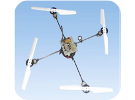Communication and control co-design for networked systems
Carlos Canudas de Wit ![]()
Alain Kibangou ![]()
Federica Garin ![]()
Energy-aware communication and control co-design in wireless networked control systems
We have considered an event-based approach to energy-efficient management of the radio chip in the sensor node of a wireless networked control system. Indeed the radio is the main energy consumer, and intermittent data transmission allows one to reduce the use of the radio. While the existing literature in the control community on event-based control only addresses policies using two radio modes (transmitting/sleep), our work follows some considerations on the radio chip modes well-known in the communication networks literature, and introduces various radio-modes: different "idle" non-transmitting modes, where only part of the radio chip is switched off (thus consuming more energy than "sleep", but allowing for faster transition to transmission), and various transmitting modes, with different power levels. We propose an event-based radio-mode switching policy, which allows to perform a trade-off between energy saving and performance of the control application; to this end, a switched model describes the system, taking into account control and communication. The optimal switching policy is computed using dynamic programming, considering a cost either over an infinite time-horizon or over a finite receding horizon.
System-theoretic analysis of modern error-correcting codes (serial turbo codes)
Serial turbo codes are a family of codes for error correction in point-to-point digital communication. The encoder can be described as the composition of three linear maps, the intermediate one being a permutation (called "interleaver"), while the inner and outer ones are convolutional codes, i.e., linear dynamical systems where state, input and output belong to a vector space over the finite field GF(2). The decoding is performed with iterative low-complexity algorithms which give a good approximation of the optimal maximum-likelihood decoder. Using system-theoretic properties of the constituent convolutional codes and probabilistic arguments, we study the average and the typical behavior of ensembles of such codes (with fixed convolutional codes and random interleaver), asymptotically in the block-length. We disprove the common conjecture that the typical behavior concentrates around the average: indeed, the average error decays polynomially in the block-length N, while the typical code has a faster error decay (exponential in some fractional power of N); however, the typical-code analysis confirms the same design parameters for the convolutional codes that were already suggested by the study of the ensemble average: free distance of the outer encoder, and effective free distance of the inner encoder.
Selected papers
- N. Cardoso de Castro, C. Canudas de Wit and F. Garin, Energy-aware wireless networked control using radio-mode management, IEEE American Control Conference, 2012.
- N. Cardoso de Castro, D. E. Quevedo, F. Garin and C. Canudas De Wit, Smart energy-aware sensors for event-based control, IEEE 51th Conference on Decision and Control, 2012.
- F. Garin, G. Como and F. Fagnani, The performance of serial turbo codes does not concentrate, IEEE Transactions on Information Theory, 2012.
- N. Cardoso de Castro, C. Canudas de Wit and K. H. Johansson, On energy-aware communication and control co-design in wireless networked control systems, 2nd IFAC Workshop on Distributed Estimation and Control in Networked Systems, 2010.
- C. Canudas de Wit and J. Jaglin, Energy-aware and entropy coding for networked controlled linear systems, International Journal of Robust and Nonlinear Control, 2009.
 Go to the full list of publications
Go to the full list of publications



















